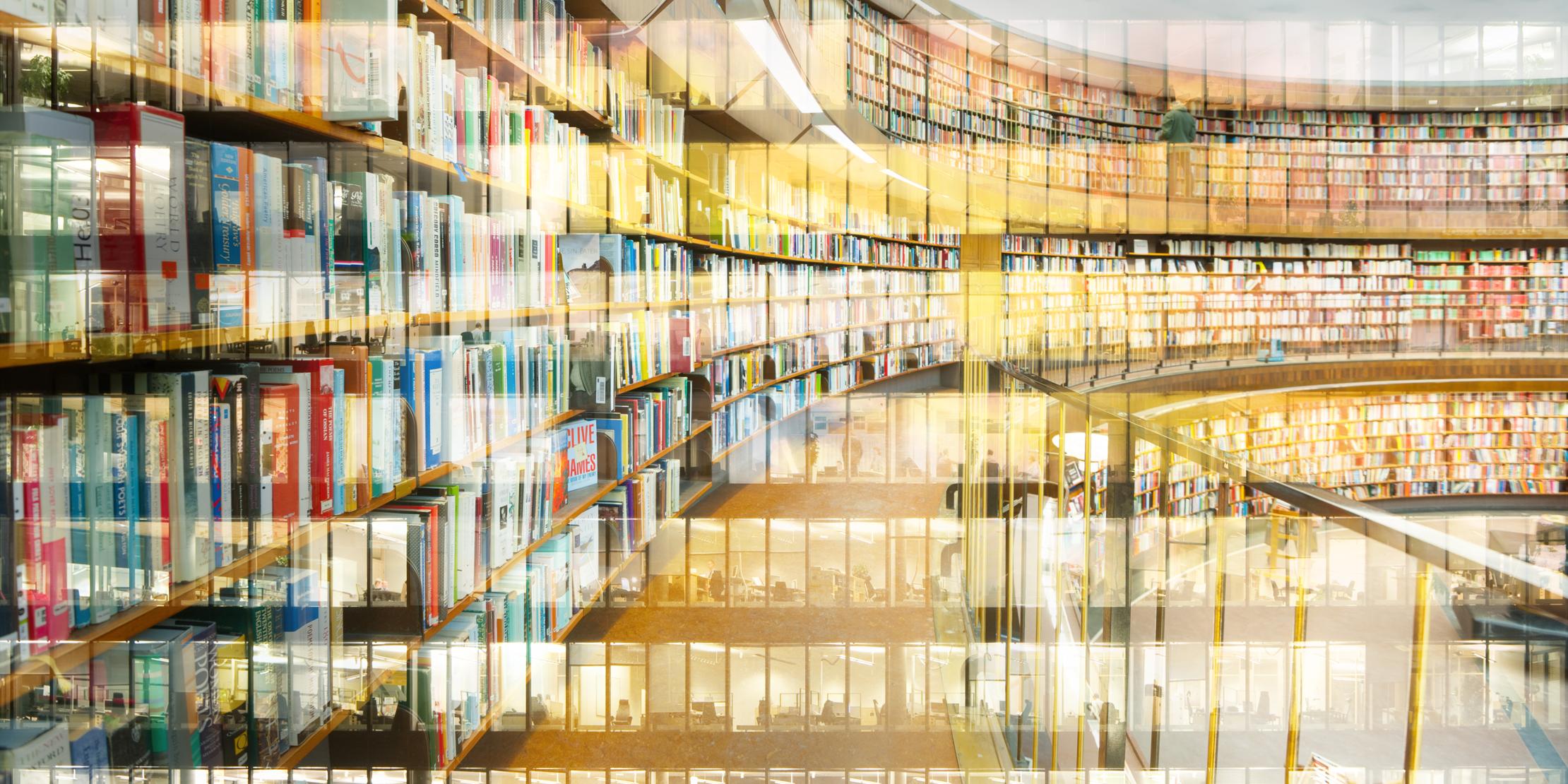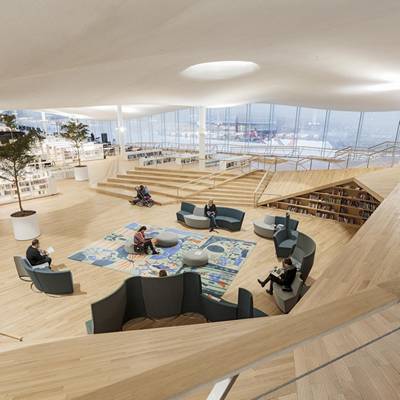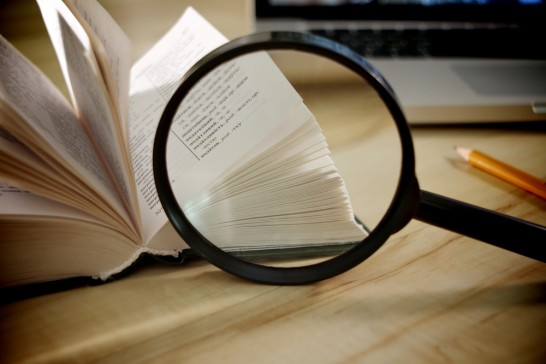
Library Science Talks
The Zentralbibliothek Zürich, the Association of International Librarians and Information Specialists (AILIS) and the CERN Scientific Information Service annually organise the Library Science Talks. The series of events offers library and archive staff the opportunity to learn from and exchange ideas with well-known personalities from the world of libraries, archives and information services.
Library Science Talks 2024
Upcoming Library Science Talks
More Library Science Talks follow
Contact:
17.06.24: Günther Giovannoni (head of the Swiss National Sound Archives) & Roberto Righini (database manager of the Swiss National Sound Archives)
"VisualAudio: saving the sound of broken records. Saving the audio heritage of a country"
The Swiss National Sound Archives (or Fonoteca) is based in Lugano and is a section of the Swiss National Library. Since 1987, the Fonoteca has been collecting, cataloguing, digitising and enhancing the audio heritage of Switzerland. Over the years, it has built an ideal infrastructure for the physical and digital preservation of all types of audio carriers and audio documents according to the international standards established by the IASA International Association of Sound and Audiovisual Archives. In parallel, it has developed technologies for reconditioning and restoring old audio carriers in cooperation with national and international institutions. In particular, the Fonoteca has developed a technology called VisualAudio that enables the extraction and saving of the sound of broken records.
29.04.24: Power Automate flow with Microsoft AI Builder
"Power Automate flow with Microsoft AI Builder"
25.03.24: Unlocking the value of grey literature
"Unlocking the value of grey literature"
06.11.23: Digital innovation at the Library of Congress: Checking in from LC Labs
"Digital innovation at the Library of Congress: Checking in from LC Labs"
03.10.23: Isabelle Le Pape & Jean-Philippe Moreux (Bibliothèque nationale de France (BnF))
"DIGITENS: DIGITal ENcyclopedia od European Sociability"
Isabelle Le Pape and Jean-Philippe Moreux propose to evoke the partnership between the Bibliothèque nationale de France and the European project, digitens, leading to the publication of an open-access digital encyclopedia about sociabilities in the long eighteenth-century. They will talk about this international and interdisciplinary project led by the GIS Sociabilités / Sociability since 2017, who promoted staff exchange and intersectoral collaborations with the Bibliothèque nationale de France (BnF, Paris), The National Archives (TNA, Kew) and the Musée Cognacq-Jay (Paris-Musées). Digitens aims to explore the wide range of topics related to British Sociability from 1650 to 1850 and, more widely, help to learn about the circulation of models of sociability that shaped European and colonial societies. Isabelle Le Pape and Jean-Philippe Moreyx will explore some collaborative works between academic researchers, archivists and curators.
12.09.23: Colleen Campbell (Max Planck Digital Library, München)
How are transformative agreements transforming libraries?
06.06.23: Mariëlle Prevoo (Maastrich University)
Maastricht University's Open Science tree - its roots, stem, and how we make it bloom.
The first Open Science policy at Maastricht University (UM) was released in 2019. Since then, there have been a lot of developments in the international and national Open Science landscape as well as within UM. As a result, the UM’s Open Science policy 2022-2026 pictures Open Science as a tree with multiple branches; i.e. Recognition & Rewards, Open Access, public engagement, FAIR data use, FAIR software, Open Educational Resources, and preregistration. In her presentation, Mariëlle Prevoo will tell you more about the roots and the stem of this tree as well as the challenges that need to be tackled in order to make the tree bloom. In this Library Science talk, of course special attention will be paid to the role that the library plays in this policy and its implementation.
Slides
23.05.23: Daphna Blatt (New York Public Library)
Articulating Public Library Impact: A Multi-Dimensional Perspective
This presentation will cover case studies in measuring and articulating library impact from the Strategy & Public Impact team's work at The New York Public Library. The case studies will include services from NYPL's branch circulating libraries and research centers, and cover themes of equity, early literacy, and civic, cultural, and scholarly impact.
Slides
14.02.2023: Reinhard Altenhöner (Staatsbibliothek zu Berlin)
Selbstorganisation und Kooperation am Beispiel des FID-Systems in Deutschland: Bibliotheken als systemischer Träger der Informationsinfrastruktur
34 Fachinformationsdienste (FID), getragen von etwa 20 Einrichtungen, sichern Wissenschaftler:innen einen schnellen und direkten, fachspezifischen Zugriff auf Spezialliteratur und forschungsrelevante Informationen. Sie ergänzen Angebote der lokalen Informationsinfrastrukturen der Hochschulen und Forschungseinrichtungen. Finanziert wird das Programm, eine Weiterentwicklung der seit 1949 aufgebauten Sondersammelgebiete an wissenschaftlichen Bibliotheken, von der Deutschen Forschungsgemeinschaft (DFG) mit über 30 Millionen € pro Jahr. Veränderte Rahmenbedingungen in Forschung und Wissenschaft (wie cross- und transdisziplinäre Ansätze, übergreifende Methoden in der digitalen Transformation, Forschungsdaten) und der Anspruch, möglichst unmittelbar veränderte Anforderungen effektiv aufzunehmen, verändern das FID-System. Und obschon die Evaluierung der einzelnen FID durch die Gutachter:innen der DFG weiterhin individuell erfolgt, gewinnt so die systemische Qualität des Netzwerks an Bedeutung – auch in der Begutachtung. Vor diesem Hintergrund kooperieren die FID-Bibliotheken seit einigen Jahren systematisch miteinander und haben dazu Instrumente der Selbstorganisation geschaffen, in denen alle FID-Einrichtungen zusammenwirken. Basis des Vorgehens ist ein Aktionsplan 2022 – 24, in dem die Mitglieder konkrete Maßnahmen vereinbart haben. Ein wichtiges Thema ist dabei die Beförderung von Synergie-Effekten im Bereich der technischen Infrastruktur. Der Vortrag stellt die Genese des Netzwerks vor, beschreibt Herausforderungen in der Umsetzung und skizziert die inhaltlichen und organisatorischen Perspektiven des Systems.
Slides
14.11.2022: José Luis Garnica Carreno (World Health Organization)
The WHO COVID-19 Research Database
https://search.bvsalud.org/global-literature-on-novel-coronavirus-2019-ncov/
https://www.who.int/publications/m/item/quick-search-guide-who-covid-19-database
1 December 2021 – The American Library Association (ALA) has conferred upon the World Health Organization a prestigious Choice award for the outstanding work carried out in building the WHO COVID-19 Research Database and for the excellence of its content, as part of the 2021 Outstanding Academic Titles list.Choice Magazine announces its exclusive list at the end of each year, with winners being drawn from reviews conducted during the previous twelve months. Through this award, the WHO COVID-19 Research Database is identified as being among the best in scholarly sources, which brings with it the extraordinary recognition of the academic library community.
Slides
10.10.2022: Kendra S. Albright (Goodyear Endowed Professor in Knowledge Management, Kent State University)
Knowledge Management in libraries
The literature on knowledge management (KM) in libraries first appeared late in the 20th century and has continued growing over the past twenty-plus years. Librarians’ understanding and use of KM practices, however, appears to be limited and varies from person to person and among institutions. The purpose of this presentation is to offer a practical overview of KM practice and what it offers to libraries. The presentation will address how the use of knowledge assets will improve practices across the organization to improve service delivery, manage change, and create a fair and equitable environment for all.
CANCELLED
06.09.2022: Danielle Cooper (New York, Ithaka S+R ):
10.05.2022: Knut Skansen (Oslo)
The new Deichman main Library - Do we still need public libraries?
Oslo public library, founded in 1785, consists of 22 libraries. During the last 6 years, almost all branch in the city have undergone an extensive upgrade and refurbishment. At the core of the design process is strong focus on social interaction and creating “public living rooms” for the communities. The development has repositioned the libraries in the city and made them more relevant than ever. This development culminated with the opening of the 20.000 square meters big Deichman Bjørvika, the new central library, in June 2020. Deichman Bjørvika has already reached the goal of 2 million visits per year despite the effects of the pandemic. In this lecture, the focus will be on the history of the public library in Europe and the design process and development of the library room as well as the change in staff competence, use of technology and user involvement. At the end of the lecture, I will draw up the major strategic lines for Oslo Public library for the next years. The lecture also includes a video from the new main library.
12.04.2022: Aimee Andersen & Sinead Beverland (Westminster University Libraries)
Library UX: Transitioning from physical to online
Aimee and Sinead discuss their previous UX role at the university of Westminster. Their talk will focus on the transition from physical to online UX projects and highlight the challenges and benefits they encountered. They will discuss their work around communication, engagement, and well-being, whilst presenting their Primo project, which focused on analysing function and usability.
15.03.2022: Dimitris Protopsaltou (Stavros Niarchos Foundation Cultural Center, Kallithea)
The impact of the SNFCC and the change in the cultural landscape in Greece
CANCELLED
15.11. 2021: Ina Blümel, Technische Informationsbibliothek Hannover
The architect in the library lab
How can architecture and librarianship benefit from each other? This talk will use some examples from the TIB - Leibniz Information Centre for Science and Technology and University Library, in particular the TIB Open Science Lab, to present the issues involved and the conditions under which this can work. The focus is on how architectural content can be disseminated into the broader society by libraries and how the in improvement of this content can be collaboratively facilitated, as well as what research infrastructures in general can do for architecture as a discipline and for architects as (research) individuals.
Slides
11.10.2021: Marie-Pierre Pausch-Antoine, University Luxembourg
The Luxembourg Learning Centre. Reinventing the Library
Library or Learning Centre? What are their places today at the heart of new university campuses?
How can we reconcile today's exceptional architecture with the functional needs of the "new" Learning Centre services? How can we avoid conflicts between the architects' wishes and the functional needs when planning spaces? How can we plan and allow the diversity of needs for learning spaces, collaborative or individual work, and meet the need for spaces where users can socialise?
And once the building is open, how can we deal with potential conflicts between the architecture, the function and the customers? Feedback from 12 years of experience of planning the LLC at the heart of the new Belval campus.
14.09.2021: Rebecca Frank, Humboldt-Universität zu Berlin
The Social Construction of Risk in Trustworthy Digital Repository Certification
Risk is a foundational concept in digital preservation. While it has been examined from technical, economic, and organizational perspectives in digital preservation, I argue that it is also a social phenomenon. In this presentation I will discuss the results from two different studies investigating the social construction of risk in digital preservation, focusing on the TRAC (ISO 16363) and CoreTrustSeal trustworthy digital repository certification systems.
Slides
18.05.2021: Matthijs van Otegem, Erasmus University Library Rotterdam
Opening up your library organisation
Libraries are a catalyst for the open science movement. We advocate open access, FAIR data and open content in online education, because we believe in the principles behind the open science movement.
So, here’s a question: how would it be if we would apply these principles within our own libraries? What would you need to open up your library organisation?
12.04.2021: Terry Brady, Eric Lopatin, University of California
Brightening an Archive – Streamlining Access to OA Datasets
Abstract
Dryad is a well-known multidisciplinary repository which houses OA research data. What’s less known is that submissions to Dryad flow directly into (and out of) CDL’s digital preservation platform, Merritt. Because every deposit must also be made available for download, Merritt’s access layer has been re-engineered to provide file and object retrieval directly from the cloud. This is a presentation about how and why we’ve focused on streamlining access – in turn making what would typically be considered a dark archive, a light one by providing building blocks for organizations to easily and securely obtain any file or object from the cloud storage providers which Merritt uses.
Bios
Terry Brady is a software developer in Seattle working for the California Digital Library - University of California Curation Center. Terry is the technical lead for the Merritt digital preservation repository. Terry is a committer for the DSpace repository platform. Terry has built applications for higher education, government, non-profit, and corporate institutions including the Georgetown University Library, LexisNexis and the National Archives and Records Administration.
Eric Lopatin is Product Manager for the California Digital Library's digital preservation initiatives, including the Merritt repository that preserves special collections content from libraries across the ten University of California campuses, eScholarship publications, ETDs, and datasets submitted to Dryad from organizations worldwide. Prior to joining CDL, Eric worked at the Public Library of Science. His recent experiences in OA publishing, as well as a string of years at Adobe Systems, have all contributed to his interests in the realms of preservation, publishing and software development.
Slides
17.11.2020: Luis Martínez-Uribe, Fundación Juan March
Libraries' adventures in data wonderland: from curation to analytics
Abstract
"Who in the world am I?' Ah, that's the great puzzle!". Libraries have undergone big changes in little time, adapting and evolving to the new digital landscapes. Digital curation is an ever growing role for libraries, ensuring that data is looked after from the moment of creation and throughout its lifecycle adding value to it and ensuring permanent access. Curation can be augmented using analytics as these two worlds blend well at many levels. For instance, data can be curated using supervised learning to categorize it, or clustering methods that support the process of entity disambiguation, or using off-the-shelf AI for automatic transcription of audio, photo tagging, sentiment analysis or keyword extraction from text. In addition to curating data using analytics, once data is well curated, a wide range of analytical methods and tools can provide insights into the way in which our organizations work and eventually those insights can be used to guide strategy. This talk will discuss the previous views illustrating them with activities from the DataLab at the Library of Fundación Juan March, a section dedicated to curation and analytics in a cultural organization devoted to the promotion of humanistic and scientific culture.
09.02.2021: Torsten Reimer, British Library London
The perfect storm - challenges for research libraries in the coming decade
Abstract
Since several years the question is frequently asked, whether libraries have a future in the digital world. In the meantime, it should have become clear also to sceptics that neither printed books nor libraries will disappear in the foreseeable future. The question of how the future of libraries could look like is much more interesting and relevant. In my presentation, I would like to discuss a series of challenges that we should face in this decade. In this context, a key question will be whether research libraries are actually in the position to play a central role in the Open Science world, and if and how we can keep control of our data in an environment of high market concentration. Thanks to the Open Science movement, information retrieval and access are more and more often located outside the library environment and within external digital services – services that are likely to fall progressively outside the libraries’ control. This raises questions concerning transparency and reliability, which are crucial for the self-perception and users’ perception of libraries. In my presentation, I will deal with these and other questions related to the digital evolution, as well as with a report of my present work on the implementation of a ten-year strategy for digital transformation in the Consortium of the British research libraries.
Slides
20.10.2020: Sylvia van Peteghem, University Ghent
Never say Never. About the Restoration of Henry van de Velde’s Booktower
The story of the Booktower starts in the 1930s when Henry van de Velde was asked to build a University Library and offices for the department of Art history for Ghent University. His tower-idea was not exactly what the chief librarian had in mind, so he had to (net)work hard to get the building he wanted. It was finished on the verge of the second world war. The concrete building has a height of 64 meter, has 24 floors and a “belvedere” and houses almost 3 million books in closed racks.
The university did not neglect the tower during all these years, but was not always aware of the historical value and often choose the cheapest way for building matters. A couple of years ago André Singer, a private person bought the Van de Velde archive of the Booktower (which was in private hands), got fascinated with the building, got angry because of lack of care and networked (maybe as hard as Van de Velde once did to get it built) to get it restored. The board of directors of the university said yes to the restoration in September 2005. It should have been finished in 2015, 2016, 2017, 2018, 2019, 2020 and now in 2025 it maybe will.
I think you will be as stunned as I was a couple of years ago when you will see how much inspiration Van de Velde brought with him from Switzerland. You will recognize parts of one of your main libraries in his beautiful Booktower. A swiss touch to a Ghent building!
16.06.2020: Sara Veldhoen, KB, National Library of the Netherlands
Generating Metadata With AI - Experience of the National Library of the Netherlands
At the KB, national library of the Netherlands, we have been experimenting with automated tools to improve bibliographical metadata processes. So far, we have focused on subject headings (from a controlled thesaurus) and author attribution (matching with authority files), tasks that require a lot of manual work from our cataloguing department. We're developing a web application that empowers the workers by filtering out irrelevant information and present substantiated suggestions.
12.05.2020: Esther Chen und Florian Kräutli, MPI WG Berlin
The Shift towards a Library of Data
For many centuries, solid units of texts were the center around which libraries commonly worked and evolved. Scholarly texts developed certain formats and were published within certain workflows, both of which remained stable over a long period of time. Responsibilities within the system of scholarly publication, dissemination, and archiving were clearly distributed between scholars, publishers, and librarians.
Over recent decades, and under the growing influence of digitization, we watch this system dissolve. Libraries are currently mid-way through a long phase of transition: this transition affects nearly all library-related fields of work, and can be described from different perspectives. One main aspect is the shift towards and the consequences of a diversification in the formats of scholarly outputs, which has invited librarians to take up new responsibilities and to broaden their expertise while transforming their libraries into libraries of data. The role of librarians within the research process is therefore changing, with new services developing in response to scholarly needs and new technical systems requiring implementation.
In our talk we will describe practical approaches, experiences, and progress made in our research library at the Max Planck Institute for the History of Science in recent years.
21.04.2020: Eliane Blumer, EPFL Lausanne
Forschungsdatenmanagement an der EPFL
Das Forschungsdatenmanagement ist seit mehreren Jahren Teil der EPFL Bibliothek. Während dieses Gesprächs nehmen wir uns Zeit, um gemeinsam durch einen typischen Tag des FDM-Teams zu gehen, der die sehr heterogenen Fragen und Unterstützungsaktionen eines solchen Angebots beleuchtet.
17.12.2019: Gerhard Lauer, Universität Basel
Digital Humanities: neue Formen der Integration der Bibliotheken in geisteswissenschaftliche Forschungsprozesse.
Abstract
Wissenschaften im 21. Jahrhundert werden als datenintensive Wissenschaften beschrieben. Das gilt im wachsenden Masse auch für die Geisteswissenschaften. Datenintensive Wissenschaften sind aber nur dann mehr als ein Versprechen, wenn sie modelliert werden können. Dazu müssen Daten ein repräsentatives und balanciertes Korpus bilden, sie müssen formalisiert, visualisiert und nachgenutzt werden können. Bibliotheken verfügen über grosse Mengen verlässliche Daten, die sich zu Korpora verdichten lassen, formalisiert und geteilt werden können. Damit werden Bibliotheken zu einem wesentlichen Teil einer datenintensiven Geisteswissenschaften. Mein Vortrag skizziert die neuen Formen der Integration der Bibliotheken in geisteswissenschaftliche Forschungsprozesse.
26.11.2019: Sigrun Habermann, United Nations Library, Geneva
UN Knowledge and Learning Commons
A Step in the Evolution of a Library: The Knowledge & Learning Commons of the United Nations Geneva
Located in a wing of the famous Palais des Nations, a neo-classical and art-deco building of the 1930s dedicated to peace through diplomacy, the Library of the United Nations Geneva serves diplomats, conference delegates and thousands of researchers around the world every year.
In 2019, the Library launched the Knowledge & Learning Commons for UN Geneva in its building. The initiative leverages existing spaces, information resources and learning and event management capacities and networks to encourage diplomats and staff to innovate, collaborate and co-create on topics relevant to professionals in the area of multilateralism.
This presentation will give you an insight into the concept of a library commons, the path of implementation taken at the United Nations Geneva, and the opportunities and outcomes that it can generate.
01.10.2019: Gildas Illien, Bibliothèques du Muséum national d’Histoire Naturelle, Paris
From Demat to Remat: Designing the post-digital library
Like many, the Library of the Natural History Museum in Paris has invested in the acquisition of electronic documentation and the digitization of its holdings over the past 20 years in order to match researchers’ expectations and keep up with the massive dematerialization of scientific publications and data in the field of natural sciences. And it has been quite successful indeed, since researchers barely use the physical library anymore. What should we do now with our empty seats, reading rooms and reference staff? Should we close the Library or try to think differently about its mission and services? Designing the post-digital library and revisiting the potential of its materiality is not about going backwards. The digital experience and the dematerialization of cultural transactions has impacted our users’ lives in many ways. There are things people are starting to miss, senses that need to be reactivated. What if the library could be a good place to start addressing this sense of loss and look at the physical and social experience of a reading room or the discovery and manipulation of original, heritage collections as legitimate services of their own?
Located in between green houses, exhibition galleries, a botanical garden and a zoo, the Museum’s Library keeps exceptional collections including archives, manuscripts, sculptures, drawings, photographs, scientific instruments and even dead and living animals and plants - all stored in the stacks and backstage. The caretakers of this hidden treasure are also incredible storytellers. Our vision is that the future of the Library may somehow lie behind this scene, in the emotional and material strength and inspiration of this heritage and the passion of the people in charge of their conservation. Making the library “hyper-material” again may be our chance and our next challenge. This presentation will develop the vision of a post-digital library focused on human experience and tell the story of how its team has successfully engaged major organizational changes in order to start experimenting new forms of mediation and reach a totally new public.
04.06.2019: Tuula Haavisto, City of Helsinki
The opening of the Helsinki Central Library Oodi in December 2018 was a grand event in whole Finland, gathering 55 000 people to the library during two days. More success followed, the first million of visitors was broken at the end of March 2019. The same pace is still continuing.
Very attractive to our Mayor and other politicians is the fact that Oodi brings a lot of good reputation to Helsinki. Only in 2018, the calculatory media coverage was worth of nearly 11 million euros.
This popularity is a result of decisive and ambitious planning. I would argue that this is in the air – Helsinki is not the only city building a big central library: Aarhus, Oslo, Gent... These open buildings are an answer to a clear need in the society. In practice, the success consisted of participation of citizens, quality architecture, systematic PR work and political understanding, which was greatly pushed by the covering support from citizens.
We planned a library with citizens, not for citizens. Now they really feel ownership of the library.
Tuula Haavisto is the Cultural Director of the City of Helsinki, Finland. From March 2013 to the end of July 2017, she served as the Library Director in Helsinki. Before that, she worked in the Tampere City Library in the same role. 1997-2006 Haavisto run her own consultancy ‘Tuula Haavisto Library Knowledge T:mi’, working on domestic and international projects, training and development. On 1987-97 she was the Secretary General of the Finnish Library Association. Before that period, she had librarian and researcher posts in the Ministry of Environment, Academy of Finland and others.
Ms Haavisto is Master of Social Sciences from Tampere University (1983). She has had numerous positions in professional organisations, given articles and lectures and run other activities in Finland and abroad during her career. At the moment she is Chair of the Steering Group of Data Management of the National Library of Finland.

21.05.2019: Trevor Owens, Library of Congress
Die wachsende Rolle von Daten in unseren Nutzergruppen und Organisationen verlangt von uns allen, im verantwortlichen Umgang und im Erhalt digitaler Daten selbst aktiv werden. Die Herausforderung scheint gewaltig zu sein, aber die gute Nachricht ist, dass wir es nicht alleine tun müssen. Ein verteiltes Netzwerk von Fachleuten und Lernenden auf der ganzen Welt entwickeln zunehmend Wege, um gemeinsam Erfahrungen zu sammeln sowie Ressourcen zu teilen und zu bündeln. Auf diese Weise können wir die Herausforderungen angehen und einen dauerhaften Zugang zu unserem digitalen Erbe ermöglichen.
Dieser Vortrag gibt einen Überblick zu den Grundprinzipien des Datenmanagements und eine Orientierung darüber, wie man sich mit der internationalen Gemeinschaft von Experten verbinden und mit ihr zusammenarbeiten kann, um die Arbeit im verantwortlichen Umgang mit Daten und im Datenerhalt zu entwickeln und verfeinern.
Dr. Trevor Owens ist Bibliothekar, Forscher, policy maker und Dozent und arbeitet im Bereich digitale Infrastrukturen für Bibliotheken. Owens ist der erste Leiter des Digital Content Management in der Library of Congress. Darüber hinaus unterrichtet er Graduiertenseminare in digital history für das American University’s History Department und digital preservation für das University of Maryland's College of Information, in dem er auch Forschungspartner des Digital Curation Innovation Center ist.
2016 – 2018
04.12.2018 | Amélie Vallotton (Alliance Sud InfoDoc, CH) | «Equal before the Internet» |
02.10.2018 | Steve Dickson (FaulknerBrowns Architects, UK) | «A library for the 21st century» |
04.09.2018 | Deborah Kyburz (ETH Zürich Library, CH) | «Marketing content and collections» |
26.06.2018 | Daniel Himmelstein (University of Pennsylvania, US) | «Sci-Hub and the future of publishing» |
29.05.2018 | Raivo Ruusalepp (National Library of Estonia) | «Digital legal deposit» |
27.03.2018 | Emmanuelle Bermès (Bibliothèque Nationale de France) | «Text, data and link-mining in digital libraries» |
05.12.2017 | Jukka Relander (EBLIDA and Finnish Library Association, FI) | «Library associations: a call to action. National advocacy and the implementation of the SDGs (the 2030 Agenda of the United Nations)» |
| 17.10.2017 | Sherri Aldis (United Nations, New York, US) | «Access to UN information in the digital era: reengineering the UN depository libraries programme» |
12.09.2017 | Daniel V. Pitti (Institute for Advanced Technology in the Humanities, University of Virginia, US) | «Leveraging VIAF in social networks and archival context» |
13.06.2017 | Gerald Beasley (University of Alberta Libraries, CA) | «National archiving concepts in Canada, linked to fair dealing concept» |
09.05.2017 | Marie Østergård (Aarhus Public Libraries, DK) | «Dokk1: re-inventing space praxis» |
28.03.2017 | Daniel van Spanje (OCLC Leiden, NL) | «The rise and fall of the cataloguer’s empire: an update» |
| 05.12.2016 | Ruben Verborgh (Ghent University, BE) | «Linked Data and sustainable publication» |
13.09.2016 | Courtney Mumma (Internet Archive, San Francisco, US) | «Cooperative Collection Building at the Internet Archive» |
21.06.2016 | Alexander Grossmann (Hochschule für Technik, Wirtschaft und Kultur Leipzig, DE) | «New perspectives in scientific publishing» |


